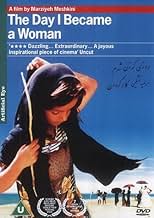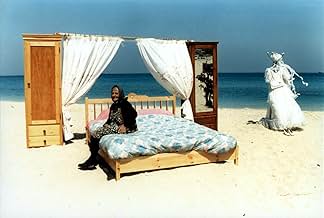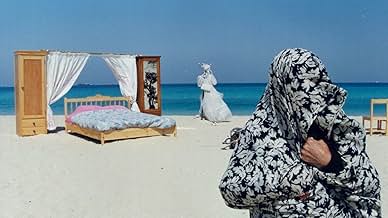IMDb RATING
7.3/10
2.1K
YOUR RATING
Three linked stories show women at life's crossroads: a girl's 9th birthday, a cycling race, and an elderly woman's dream of buying long-desired items.Three linked stories show women at life's crossroads: a girl's 9th birthday, a cycling race, and an elderly woman's dream of buying long-desired items.Three linked stories show women at life's crossroads: a girl's 9th birthday, a cycling race, and an elderly woman's dream of buying long-desired items.
- Director
- Writers
- Stars
- Awards
- 10 wins & 5 nominations total
- Director
- Writers
- All cast & crew
- Production, box office & more at IMDbPro
7.32.1K
1
2
3
4
5
6
7
8
9
10
Featured reviews
A treat to watch!
I saw this gem of a film a few months ago and it has lived with me ever since. There are lots of great things to talk about but I will only mention a few. I liked the striking images of the sea and the shore and the manner in which they are imbued with great meaning. The sea - which represents adventure, sensuality, fluidity, freedom and sex - is a constant motif throughout the film and is a joy to look at. I also liked the structure - reminiscent of Hemingway's short stories - where characters from one story seem to reappear in others.
But though connected through theme and also through the plot, the individual films retain a great level of distinctiveness. For instance, the second film remains unresolved at the end and the discussion of the two fellow riders in the third movie only have the effect of heightening that suspense. On the other hand, the third film has the effect of satisfactorily and unexpectedly wrapping up the first film: whereas the girl in the first film was denied the chance to enjoy the sea (and everything it represents), the old woman in the third film takes her revenge by completely inverting tradition. The image of the old woman and those motifs of domesticity being carried away on the sea is unusual but also funny. In putting not only herself but also her whole house on the sea, the old woman has inverted tradition and has the ultimate revenge.
But though connected through theme and also through the plot, the individual films retain a great level of distinctiveness. For instance, the second film remains unresolved at the end and the discussion of the two fellow riders in the third movie only have the effect of heightening that suspense. On the other hand, the third film has the effect of satisfactorily and unexpectedly wrapping up the first film: whereas the girl in the first film was denied the chance to enjoy the sea (and everything it represents), the old woman in the third film takes her revenge by completely inverting tradition. The image of the old woman and those motifs of domesticity being carried away on the sea is unusual but also funny. In putting not only herself but also her whole house on the sea, the old woman has inverted tradition and has the ultimate revenge.
"Giiiirl, You'll be a Woman...Sooooon..."
I had completely forgotten about this movie, until I had a dream about the bicycles and the beach at the end. The more I thought back, the more I wanted to see it again.
I know this film has a very firm political message, but the images are so simple, universal and kinda powerful they linger with you, or at least have with me for years.
Three stories, none of which connect, about woman living in Iran, a young girl who finds out she has has to go to the "all girls" school soon, leaving behind her male friends, a woman bicycles away from her wedding and refuses to pull over, an and elderly woman whose husband is dead who can now do what she has always wanted, create the home of her dreams, with furniture right along the beach; a house without walls.
Effective, original, and poignant. When does one, become a woman(or man), and why? How is it different for each character, how is it the same, and what does is spell out once it's all putt together? ...almost makes me want to learn to ride a bike.
I know this film has a very firm political message, but the images are so simple, universal and kinda powerful they linger with you, or at least have with me for years.
Three stories, none of which connect, about woman living in Iran, a young girl who finds out she has has to go to the "all girls" school soon, leaving behind her male friends, a woman bicycles away from her wedding and refuses to pull over, an and elderly woman whose husband is dead who can now do what she has always wanted, create the home of her dreams, with furniture right along the beach; a house without walls.
Effective, original, and poignant. When does one, become a woman(or man), and why? How is it different for each character, how is it the same, and what does is spell out once it's all putt together? ...almost makes me want to learn to ride a bike.
10jakub66
Minimalism and Painful Clarity
Having followed Iranian cinema for a while I didn't think I was in for a surprise but Meshkini (director) managed to blow me away with the minimalist approach to depicting the fundamental issues of Iranian society. The elegance, minimalism and eloquence of this picture manage to depict the role of a woman in Iran with painful clarity.
"Roozi khe zan shodam" is an essential and defining piece of cinema.
"Roozi khe zan shodam" is an essential and defining piece of cinema.
Short and sweet
I felt the need to defend this film as I don't believe it deserves the above rant. It is true that we are not given many details about the three characters whose stories are presented. But we are given enough to feel sympathy for the girl whose childhood is over, the woman who just wants to be allowed to ride her bike, and the woman who was finally able to buy the things she's always wanted. The English title evokes an expectation that each of these stories represents a transition.
As a woman, it sometimes occurs to me to wonder what that means exactly. This film explores the fact of being a woman and what it means to become one. Was Hoora not a woman before today? We are left to imagine what her life was like before and what brought her to this circumstance, but clearly these details are not so important.
This film is an exploration, not a documentary. It is beautiful and bittersweet (and personally I liked the music) It is not Hollywood by any standard but it is not complicated and even to a Westerner like me it held a lot of truth. It's purpose can be as much to explore one's own views as those of the Iranian filmmaker, and should be viewed as a piece of art rather than a mainstream American movie. Give it a chance, it's only 74 minutes.
As a woman, it sometimes occurs to me to wonder what that means exactly. This film explores the fact of being a woman and what it means to become one. Was Hoora not a woman before today? We are left to imagine what her life was like before and what brought her to this circumstance, but clearly these details are not so important.
This film is an exploration, not a documentary. It is beautiful and bittersweet (and personally I liked the music) It is not Hollywood by any standard but it is not complicated and even to a Westerner like me it held a lot of truth. It's purpose can be as much to explore one's own views as those of the Iranian filmmaker, and should be viewed as a piece of art rather than a mainstream American movie. Give it a chance, it's only 74 minutes.
Brilliant
Absolutely stunning. On the surface it's a triptych of short stories showing a girl, young wife, and old woman in Iran, but it plays as allegory, and the way it's executed by director Marzieh Meshkini is masterful. She shows great restraint and precision in everything she does, delivering a message with enough ambiguity to make the viewer ponder, and yet clearly showing the constraints of being a woman in a male-dominated society. The middle story in particular was as poetic and profound an expression of the patriarchy as I've ever seen; it was simply breathtaking. This is a film that should be far better known and seen; seek it out.
Did you know
- TriviaMarzieh Makhmalbaf's directorial film debut.
- GoofsIn the first sequence, the lollipop that Hava and Hassan pass between them grows and shrinks in size without regard to the passage of time.
- Quotes
Grandmother: Will you promise to be back by noon?
Hava: I promise!
Grandmother: God won't forgive you if you lie. Don't be late.
- ConnectionsFeatured in Women Make Film: A New Road Movie Through Cinema (2018)
Details
- Release date
- Country of origin
- Official sites
- Language
- Also known as
- Dagen då jag blev en kvinna
- Filming locations
- Kish Island, Iran(location)
- Production companies
- See more company credits at IMDbPro
Box office
- Budget
- $180,000 (estimated)
- Gross US & Canada
- $149,971
- Opening weekend US & Canada
- $48,255
- Apr 8, 2001
- Gross worldwide
- $149,971
Contribute to this page
Suggest an edit or add missing content























